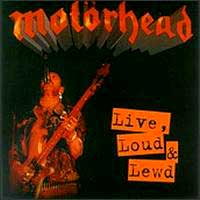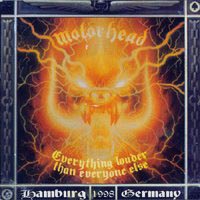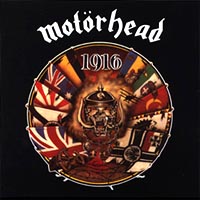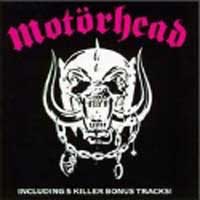Motörhead
Motörhead - 1916 (1991)
Motörhead - Live, Loud and Lewd (1998)
Motörhead - Everything Louder than Everyone Else (1999)
Review: Before their career as the sculptors of riff that framed future styles of metal, Motorhead were an exceptional roadhouse band, combining a tradition of simple and loud rock-country with the melodic songwriting technique of a progressive rock band and wrapping it in a fusion of angry punk rock and melancholic, balladesque heavy metal. It is in this style that the first and most musically consistent album of this band is created, rendering poetic tales in familiar song forms with heaps of new technique and noisy harbingers of the metal revolution to follow. While vocalist Lemmy actually sings for large portions of this album, the first touches of his unearthly gravel voice, forerunner of death and black metal, peek out behind the sonority.
1. Motörhead
2. Vibrator
3. Lost Johnny
4. Iron Horse/Born to Lose
5. White Line Fever
6. Keep Us On The Road
7. The Watcher
8. The Train Kept A Rollin'
9. City Kids
10. Beer Drinkers And Hell Raisers
11. On Parole
12. Instro
13. I'm Your Witchdoctor
Length: 54:33
At the time (1976) that this music was created, proto-metal had barely defined itself through Black Sabbath, and it was uncertain whether the new genre would flounder into its wankier tendencies or weld itself into a distinct artform. Motorhead were among the first to integrate the even simpler and more effective riff technique of punk, and simultaneously, took metal away from its emerging aharmonic properties, making songs that like those of Led Zeppelin and the Beatles were built around beautifully developing vocal lines supported by changing phrases in rhythm guitar that did not strictly conform to the verse-chorus riff distinctions favored by most rock bands. Although by today's metal standards this album is easy listening, at the time it was a venality of sound that similarly confronted a comfortable bourgeois lifestyle with images of road-veneered, outsider lifestyles, and unravelling tales of drinking, slackerdom, gambling, fighting, drugs and evading law enforcement. In this, Motorhead was closer to the Celtic folk-rock of AC/DC than the noodly neoclassical guitar of Judas Priest or Iron Maiden, but it maintained a strong tradition of songwriting that did not allow riffing to overwhelm the overall construction of continuity.
Much of this album seems artifact, including the bluesy leads and breaks, the aluminum voice of the second singer, some lounge jazz-influenced riffs, and a laid-back pace that often makes one wonder if this is indeed a metal album. However, by sidling up to the music of the day and approximating its behavior while injecting the new ideas of metal and punk, Motorhead created a bridge between the longstanding tradition of British and American roadhouse rock with the more structured music emerging in heavy metal. Artistically, it is the most consistent and sometimes challenging work from this pointwalking band.

1. Watcher
2. Iron Horse/Born to Lose
3. On Parole
4. White Line Fever
5. Keep Us on the Road
6. Leaving Here
7. I'm Your Witchdoctor
8. Train Kept A Rollin'
9. City Kids
10. Motorhead
11. Iron Fist
12. Overkill
Length: 46:50
Overlooked by most metalheads because of its lack of conformity to genre metal standards, this live recording shows early Motorhead in the transition between their roadhouse rock first album and the aggressive punk-influenced metal of their later career. Without a studio backing them up, the band are stripped down for combat, with raw vocals and uptempo perspectives on their songs, sounding more like a metal band playing an icehouse gig on an off-night. The performance is spectacular, including alternatingly bluesy and folksy solos from Fast Eddie Clarke (formerly of Fastway, which shows how in the right combinations musicians become brilliant who would otherwise be average), and has songs from "On Parole" and "Overkill." For those who like good music regardless of genre and aesthetics, or anyone who wants to see what more than Venom inspired the extremities of death/black metal, this album is an entry-priced offering that does not disappoint.

1. Iron Fist
2. Stay Clean
3. On Your Feet or On Your Knees
4. Over Your Shoulder
) 5. Civil War
6. Burner
7. Metropolis
8. Nothing Up My Sleeve
9. I'm So Bad Baby I Don't Care
10. The Chase is Better Than the Catch
11. Take the Blame
12. No Class
13. Overnight Sensation
14. Sacrifice
15. Born to Raise Hell
16. Lost in the Ozone
17. The One to Sing the Blues
18. Capricorn
19. Love for Sale
20. Orgasmatron
21. Going to Brazil
22. Killed by Death
23. Bomber
24. Ace of Spades
25. Overkill
Length: 110:55
Much like the speed freaks for whom the band is named, Motorhead gain stamina after a career that would have spent any other band, and newer personnel who are themselves seasoned veterans help chaosmeister Lemmy Kilmister organize his songs into a consistent and hard-hitting aesthetic. This uniformity helps the melodies and rhythms stand for themselves, which they do, enduring the exhaustive entropic influence of time and the music industry. One could debate endlessly over whether or not all of the classic Motorhead tracks are on these two CDs, but an ample enough selection is present, and with repetition and the audience-sage wisdom of new band members, they have undergone a winnowing process where excess has been removed and their stronger attributes are emphasized clearly. The selection mostly favors middle-period Motorhead and songs from the blockbuster "1916," but a smattering of newer works appear as well. Musicianship is professional and sound quality is good enough to make this a preferred introduction to a band that despite all of its promise rarely wrote an album consistent enough to be great, although its standout tracks were better than anything else available at the time.

1.The One to Sing the Blues
2.I'm So Bad (Baby I Don't Care)
3.No Voices in the Sky
4.Going to Brazil
5.Nightmare/The Dreamtime
6.Love Me Forever
7.Angel City
8.Make My Day
9.Ramones
10.Shut You Down
11.1916
Length: 39:28
Genius in music is one part talent, one part knowledge of the art, and one part study habits, and Motorhead have only laid down on the job for the last part of the equation. Groundbreaking albums like "Overkill" and "Orgasmatron" were amazing at their peaks, and mundane in their valleys, suggesting an initial impetus running afoul of slack behavior and distracting personal habits, ending with material being patched together in the studio or right before. As a result, songs that redefined the world of metal stand next to stuff too insubstantial to insulate paper for shipping. "1916" turns savagely against that past failing and stays to the thorny narrow path of making songs for listeners, which carefully incubated have more melodic hook and consistency than previous albums. Although it runs the gamut from hypercaffeinated roadhouse rock to ballads to mid-paced metal that borrows as much from punk and speed metal as Motorhead's past, these new songs hit hard and stick with the listener much as any classic pop should do. Defiant masterpieces like "Angel City" and "No Voices in the Sky" capture the metal spirit as much as any Motorhead tracks, but the use of minor key vocal melodies melding carelessly into disharmonic choruses marks this as prescient to the coming genre of alternative and grunge. As if carefully edited by a master, this album presents the best of classic Motorhead with a renewed dedication to make songs to tear up the radio and the eardrum alike, and as of this writing, is the best effort from Motorhead's later career.
